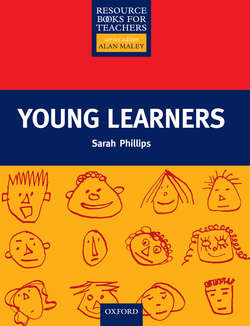Young Learners

Реклама. ООО «ЛитРес», ИНН: 7719571260.
Оглавление
Sarah Phillips. Young Learners
Acknowledgements
The author and series editor
Foreword
Introduction
How to use this book
1 Listening
1.1 Listen and do – TPR activities
1.2 The Frog family
1.3 Timmy goes shopping – listen and identify
1.4 Complete a grid
1.5 The Pied Piper – listen and draw a route
1.6 Make an instructions machine
1.7 The teacher is a cassette player
1.8 In the playground – a picture dictation
2 Speaking
2.1 Simple speaking activities
2.2 On the farm – an information gap activity
2.3 A class survey – favourite sports
2.4 Tongue-twisters
2.5 The Three Little Pigs – a story build
2.6 A questionnaire on health
2.7 Telling lies
3 READING
3.1 Making greetings cards – read and draw
3.2 Problem solving
3.3 The washing line
3.4 Sort it out
3.5 At a restaurant
3.6 Making milkshakes
3.7 Your lucky number
4 Writing
4.1 Variations on a gap
4.2 The other day …
4.3 The chocolate cake
4.4 Simple poems
4.5 Name poems
4.6 Story writing
5 Vocabulary and grammar
5.1 Flashcard ideas
5.2 Vocabulary networks
5.3 Guess the words
5.4 A very long sentence
5.5 Odd words out
5.6 The lost pet
5.7 Keeping the rules
5.8 Colour parsing
6 Games
6.1 Forming groups
6.2 Scoring games
6.3 Word games
6.4 Happy families
6.5 A board game
6.6 Carolyn’s grammar game
6.7 A treasure hunt
6.8 Body writing
6.9 All change
7 Songs and chants
7.1 Action songs
7.2 Poems, rhymes, and chants to say
7.3 Exploiting songs
8 Craft Activities
8.1 Milly and Molly and the Big, Bad Cat
8.2 Vocabulary jigsaws
8.3 Pick up twos (pelmanism)
8.4 Make a weather clock
8.5 Spinners
8.6 Twin plasticine monsters
8.7 Making puppets
8.8 Growing seeds
8.9 Making masks
8.10 Making books
9 Video
9.1 Making the most of a video
9.2 Spot the items
9.3 Act out a scene
9.4 Back-to-back
9.5 Film a dialogue
10 Putting it all together
Photocopiable Worksheets
Further reading
Indexes
Отрывок из книги
Sarah Phillips trained as an English Language teacher at the Bell School, Norwich, and took her MA in ELT at Edinburgh University. She has held various teaching posts in Europe and has taught on primary teacher training courses with the Norwich Institute of Language Education. She has worked with the Regional Government of Galicia to prepare training courses and materials for teachers of English. She was part of a team that produced a video of children’s songs and games with LINGUA support. At the moment she is working on a textbook for children and teaching at the Instituto de Idiomas at the University of Santiago de Compostela. She is the author of Drama with Children, in this series.
Alan Maley worked for The British Council from 1962 to 1988, serving as English Language Officer in Yugoslavia, Ghana, Italy, France, and China, and as Regional Representative for The British Council in South India (Madras). From 1988 to 1993 he was Director-General of the Bell Educational Trust, Cambridge. From 1993 to 1998 he was Senior Fellow in the Department of English Language and Literature of the National University of Singapore. He is currently a freelance consultant and Director of the graduate English programme at Assumption University, Bangkok. His publications include Quartet (with Françoise Grellet and Wim Welsing, OUP 1982), Literature, in this series (with Alan Duff, OUP 1990), Beyond Words, Sounds Interesting, Sounds Intriguing, Words, Variations on a Theme, and Drama Techniques in Language Learning (all with Alan Duff), The Mind’s Eye (with Françoise Grellet and Alan Duff), and Learning to Listen and Poem into Poem (with Sandra Moulding). He is also Series Editor for the Oxford Supplementary Skills series.
.....
The years at primary school are extremely important in children’s intellectual, physical, emotional, and social development. They go through a series of stages, progressively acquiring skills that are thought necessary by the society they live in. Many of these skills are independent, and if one has not been sufficiently developed, the acquisition of another may be impeded. For example, children who are unable to identify the odd shape in the following group will have difficulty in differentiating between the letters p, b, and d.
Similarly, if an older child is unable to dissociate him- or herself from the here and now, and to project and enter into imaginary or hypothetical worlds, he or she will find it difficult to make deductions from evidence, to apply his or her own experience to other situations, or indeed to accept that the world has not always been as it is now. This is a serious handicap in educational systems in which knowledge is usually acquired from books and not from firsthand experience.
.....